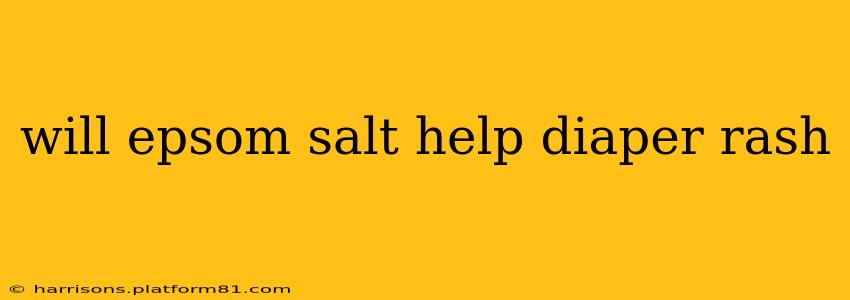Diaper rash is a common problem for parents, causing discomfort and distress for both baby and caregiver. While many remedies exist, some parents wonder about the effectiveness of Epsom salt in treating diaper rash. This article explores the potential benefits and risks of using Epsom salt for diaper rash, examining the evidence and offering alternative solutions.
Does Epsom Salt Soaking Help Diaper Rash?
The short answer is: likely not directly, and potentially harmfully. While Epsom salt baths are sometimes touted for soothing irritated skin, there's no scientific evidence to support its use in treating diaper rash specifically. The main active ingredient in Epsom salt, magnesium sulfate, is absorbed through the skin to a minimal extent, and its effects on skin inflammation are not well-established in the context of diaper rash. Moreover, the concentration of Epsom salt needed to have any potential effect could irritate the already sensitive skin of a baby, worsening the rash.
What Causes Diaper Rash?
Understanding the root causes of diaper rash is crucial for effective treatment. Diaper rash typically stems from prolonged exposure to moisture, friction from the diaper, and irritation from urine and feces. Yeast infections, bacterial infections, and allergic reactions to certain products can also contribute.
Are There Other Home Remedies for Diaper Rash?
Several gentler and more effective home remedies can help alleviate diaper rash symptoms:
- Frequent Diaper Changes: This is the cornerstone of diaper rash prevention and treatment. Keeping the skin clean and dry minimizes irritation.
- Air Drying: Allowing the baby's bottom to air dry for periods during the day helps prevent moisture buildup.
- Barrier Creams: Applying a thick, protective barrier cream, such as zinc oxide paste, creates a physical barrier against irritants.
- Gentle Cleaning: Using lukewarm water to clean the affected area, avoiding harsh soaps or wipes, is crucial.
Can Epsom Salt Make Diaper Rash Worse?
While unlikely to directly cure diaper rash, using Epsom salt could potentially worsen the condition. The salt's high concentration can further irritate already inflamed skin, potentially leading to increased redness, discomfort, and even secondary infections. Never apply Epsom salt directly to the diaper rash.
When Should I See a Doctor About Diaper Rash?
Seek medical attention if:
- The rash is severe, widespread, or doesn't improve after a few days of home care.
- The rash is accompanied by fever, lethargy, or other signs of illness.
- The rash appears unusually red, blistered, or pus-filled.
- You suspect a yeast or bacterial infection.
What are the Best Treatments for Diaper Rash?
The best treatment for diaper rash depends on its cause. For most cases, frequent diaper changes, air drying, and barrier creams are sufficient. However, more targeted treatments, such as antifungal creams for yeast infections or antibiotic ointments for bacterial infections, may be necessary if the rash persists or worsens. Always consult a pediatrician for diagnosis and treatment recommendations.
Is There a Safe Way to Use Epsom Salt for Baby Skin Issues?
While there's limited evidence supporting the use of Epsom salt for diaper rash, using very diluted Epsom salt in a bath might offer some relief for other mild skin irritations. However, this should only be done under the guidance of a pediatrician, and the concentration must be extremely low to avoid irritating the baby's delicate skin. This is not recommended for diaper rash specifically.
In conclusion, while Epsom salt baths might seem like a home remedy solution for various skin irritations, it's not a suitable treatment for diaper rash. Focusing on frequent diaper changes, gentle cleaning, and the application of barrier creams are much safer and more effective approaches to managing and treating diaper rash. Always consult a healthcare professional if you have concerns about your baby's skin health.
